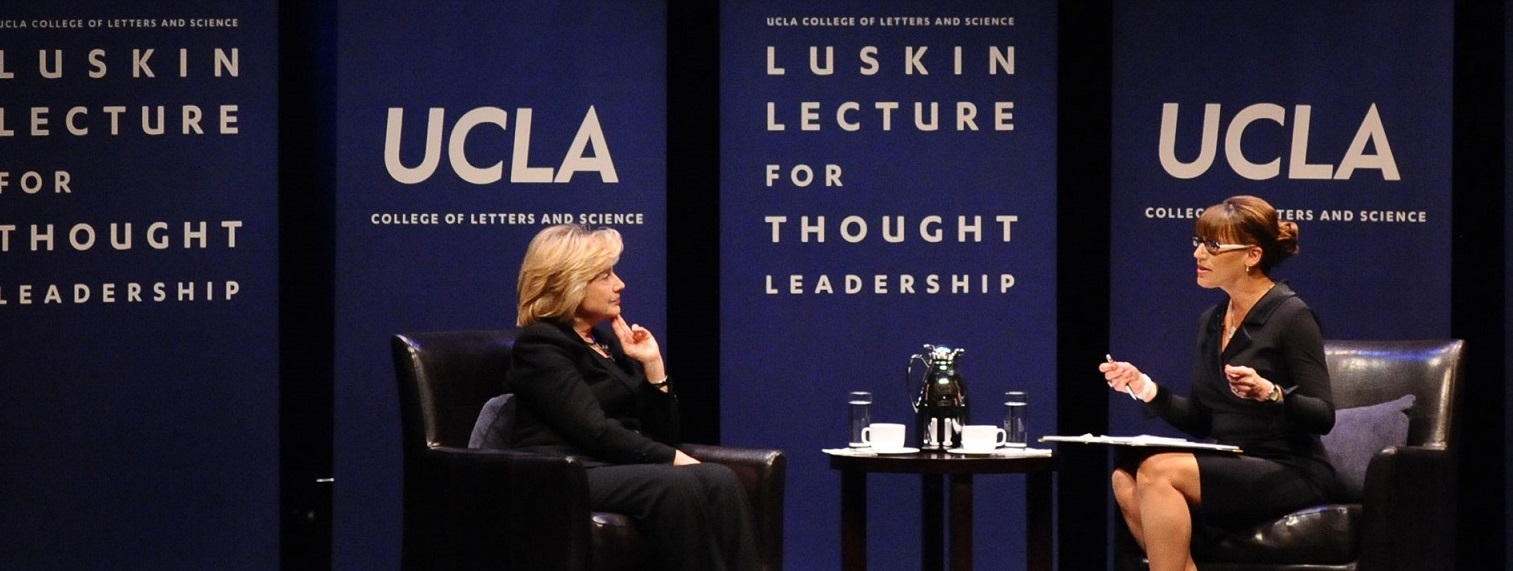
To think Martha Gonzalez almost didn’t attend college.
玛莎·冈萨雷斯(Martha Gonzalez)差点就没上成大学。
The 1999 UCLA graduate is now a celebrated musician-activist, college professor and feminist intellectual. And in October, she was one of 25 people to receive a coveted MacArthur Fellowship for 2022.
1999年毕业于加州大学洛杉矶分校的她现在是一位著名的音乐活动家、大学教授和女权主义知识分子。今年10月,她是获得令人垂涎的2022年麦克阿瑟奖学金的25人之一。
The award, which carries a prize of $800,000 and is often referred to as the “genius grant,” is presented to scholars and artists who demonstrate exceptional creativity and whose track records promise more exciting creative work. Gonzalez was recognized for her dedication to strengthening relationships across the U.S.–Mexico border through transnational collaborative recording projects and using participatory music and art to strengthen communities.
该奖项的奖金为80万美元,通常被称为“天才奖”,颁发给那些表现出非凡创造力、过往记录有望带来更多令人兴奋的创造性作品的学者和艺术家。冈萨雷斯通过跨国合作录制项目,以及利用参与式音乐和艺术加强社区,致力于加强美墨边境的关系,因此获得了认可。
A few weeks after the award was announced, she reflected on her unconventional path to the honor.
获奖消息公布几周后,她回顾了自己不走寻常路的获奖经历。
“My mother had a second-grade education and my father did not graduate high school,” said Gonzalez, who grew up in the Boyle Heights neighborhood of Los Angeles. “College wasn’t on my radar. I went to the Navy recruiter to enlist, but I was too young. He told me to come back in a year.”
冈萨雷斯在洛杉矶博伊尔高地(Boyle Heights)社区长大,她说:“我母亲只有二年级教育,我父亲没有高中毕业。上大学不在我的考虑范围之内。我去海军征兵处应征入伍,但我太年轻了。他让我一年后再来。”
A friend’s mother suggested she enroll at Pasadena City College. As a student there, Gonzalez discovered her talents for writing and critical thinking.
一位朋友的母亲建议她进入帕萨迪纳城市学院。在求学期间,冈萨雷斯发现了自己在写作和批判性思维方面的天赋。
Today, 30 years later, Gonzalez describes herself as a “Chican@ Artivista.” She believes fervently that music has the power to unite communities, probe the human condition and inspire action.
30年后的今天,冈萨雷斯称自己是“Chican@ Artivista”。她坚信音乐具有团结社会、探索人类状况和激发行动的力量。
Gonzalez’s life was shaped by music. She and her siblings were trained by their father in the tradition of ranchera singing, a popular genre of Mexican music. She learned not by reading sheet music, but by listening and repeating verses after her father. For part of her preteen years, she and her sister Claudia, sang backing vocals for her brother Gabriel; the siblings toured under the name Gabrielito González, La Actuación Infantil.
音乐塑造了冈萨雷斯的一生。她和她的兄弟姐妹在父亲的训练下学会了传统的墨西哥流行音乐——牧场主唱法。她不是通过阅读乐谱来学习,而是通过听并跟着父亲背诵诗句来学习。在她十几岁前的一段时间里,她和姐姐克劳迪娅(Claudia)为哥哥加布里埃尔(Gabriel)伴唱;这对兄弟姐妹以Gabrielito González, La Actuación Infantil的名字巡演。
“Those were experiences rich in music and culture,” Gonzalez said. “But they were sad times, too. My father was obsessed with making it in the commercial music world. That’s what capitalism as a value system does to music culture: It associates it with upward mobility and financial success. And it drains you.”
“那些经历充满了音乐和文化,”冈萨雷斯说。“但那也是悲伤的时刻。我父亲一心想在商业音乐圈闯出一番天地。这就是资本主义作为一种价值体系对音乐文化的影响: 它将音乐文化与向上流动和经济成功联系在一起。它会让你精疲力尽。”
Gonzalez’s father veered into alcoholism. Her mother took her four children and left. After Gonzalez graduated from high school, supporting herself and helping her mother was a top priority.
冈萨雷斯的父亲开始酗酒。她的母亲带着四个孩子离开了。冈萨雷斯高中毕业后,养活自己和帮助母亲成了她的首要任务。
While she was at Pasadena City College, a cousin encouraged her to consider auditioning for the ethnomusicology program at UCLA.
当她在帕萨迪纳城市学院读书时,她的一个表弟鼓励她考虑参加加州大学洛杉矶分校的民族音乐学课程的面试。
“I told my cousin I would never get in,” Gonzalez said. “I couldn’t even read music.”
冈萨雷斯说:“我告诉我表弟,我永远也进不去。我甚至都看不懂乐谱。”
But during the application process, Gonzalez was reassured about her credentials by UCLA ethnomusicology professor Steven Loza, who told her that her musical training and experience were valuable. Gonzalez was admitted to UCLA in 1993.
但在申请过程中,加州大学洛杉矶分校的民族音乐学教授史蒂文·洛扎(Steven Loza)让冈萨雷斯对她的资历放心,他告诉她,她的音乐训练和经验很有价值。1993年,冈萨雷斯被加州大学洛杉矶分校录取。
After spending a year on campus, she took some time off before returning in 1997 and then earning her bachelor’s degree in 1999. Music’s ability to help form community was an important part of her success, Gonzalez said.
在学校呆了一年之后,她休息了一段时间,1997年回到学校,1999年获得学士学位。冈萨雷斯说,音乐帮助形成社区的能力是她成功的一个重要部分。
“There were about five of us who took similar classes, especially in the ethnomusicology department’s performance ensembles,” Gonzalez said. “Whatever we learned in class, we would get together and practice afterwards.”
冈萨雷斯说:“我们大约有五个人上过类似的课,尤其是在民族音乐系的表演合奏组。无论我们在课堂上学到什么,课后我们都会聚在一起练习。”
After graduating, Gonzalez worked on building musical community in Boyle Heights. She coordinated an after-school arts program and performed frequently with her band Quetzal. (Quetzal Flores, the band’s founder, is Gonzalez’s partner.)
毕业后,冈萨雷斯致力于在博伊尔高地建立音乐社区。她协调了一个课外艺术项目,并与她的乐队Quetzal频繁演出。(乐队创始人Quetzal Flores是冈萨雷斯的搭档。)
Those gigs with her band were ultimately what led Gonzalez to pursue a doctorate in gender studies. Academic researchers began to take an interest in Quetzal’s music, and one of those scholars asked Gonzalez to write about it for a chapter in a book. She did.
这些与她的乐队的演出最终促使冈萨雷斯攻读性别研究博士学位。学术研究人员开始对Quetzal的音乐产生兴趣,其中一位学者请冈萨雷斯为一本书的一章写关于他的音乐。她做到了。
Some time later, while playing a gig at an academic conference, she met a professor named Michelle Habell-Palán who, it turned out, had been teaching students about Quetzal’s music. “I told her I was interested in graduate school, and she said I should come to the University of Washington,” Gonzalez said. “And that’s how I met my advisor.”
过了一段时间,在一次学术会议上演出时,她遇到了一位名叫米歇尔(Habell-Palán)的教授,后来才知道,这位教授一直在给学生们教授克特萨尔的音乐。冈萨雷斯说:“我告诉她我对读研很感兴趣,她说我应该去华盛顿大学。我就是这样遇到了我的导师。”
At Washington, Gonzalez said, she cultivated her feminist theory in light of her music and community, combining intellectual scrutiny with lived experience. She earned her doctorate there in 2013. The same year, Quetzal won a Grammy Award for best Latin rock album and Gonzalez joined the faculty at Scripps College, where she teaches now.
冈萨雷斯说,在华盛顿,她根据自己的音乐和社区,结合知识审视和生活经验,培养了自己的女权主义理论。2013年,她在那里获得了博士学位。同年,Quetzal获得了格莱美最佳拉丁摇滚专辑奖,Gonzalez也加入了斯克里普斯学院,并在那里任教。
And she returned to northeast Los Angeles with Flores and their son to continue building musical community. Quetzal, the band, has been collaborating with musicians in Veracruz, Mexico, and preparing a cross-border performance and recording project.
她和弗洛雷斯以及他们的儿子回到了洛杉矶东北部,继续建立音乐社区。Quetzal乐队一直在与墨西哥韦拉克鲁斯的音乐家合作,准备一个跨国界的演出和录音项目。
Even as she gets used to the MacArthur “genius” tag, Gonzalez said she plans to continue on the same path.
尽管她已经习惯了麦克阿瑟“天才”的称号,冈萨雷斯说她计划继续走这条路。
“Music and culture are not just pastimes and or commodities,” she said. “They are ways of knowing that carry important value systems that can sustain us. You can also demystify systems of power and build critical dialogue through music. It takes a lot of work to build and sustain musical communities, but it is never draining because the practice of music in community is generative at its core.”
“音乐和文化不仅仅是消遣和商品,”她说。“它们是了解的方式,承载着可以支撑我们的重要价值体系。你还可以通过音乐揭开权力体系的神秘面纱,建立批判性对话。建立和维持音乐社区需要大量的工作,但它永远不会耗尽,因为社区中的音乐实践的核心是生成。”




